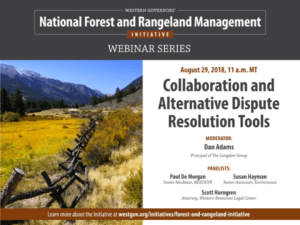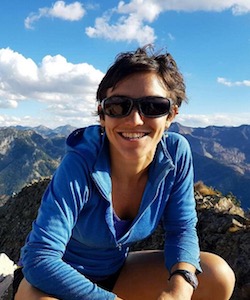By Danya Rumore for EDRBlog.org
 I often find myself wishing I had more opportunities to learn from other facilitators’ and collaboration professionals’ trials, tribulations, and successes. I was therefore excited that the Western Governors’ Association hosted a webinar on “Collaboration and Alternative Dispute Resolution Tools” on August 29, 2018. Since I suspect many others are, like me, looking to learn from the wisdom of our colleagues working the “magic of collaboration” around environmental and natural resource issues here in the west, I thought I would share some of the key takeaways from the webinar here on our EDR Blog.
I often find myself wishing I had more opportunities to learn from other facilitators’ and collaboration professionals’ trials, tribulations, and successes. I was therefore excited that the Western Governors’ Association hosted a webinar on “Collaboration and Alternative Dispute Resolution Tools” on August 29, 2018. Since I suspect many others are, like me, looking to learn from the wisdom of our colleagues working the “magic of collaboration” around environmental and natural resource issues here in the west, I thought I would share some of the key takeaways from the webinar here on our EDR Blog.
The webinar featured panelists Paul De Morgan, a Senior Mediator at RESOLVE; Susan Hayman, a Senior Associate at EnviroIssues; and Scott Horngren, an Attorney at Western Resources Legal Center. It was moderated by Dan Adams, who is the Principle of The Langdon Group and a friend, colleague, and EDR Blog guest author. The speakers provided a general introduction to a range of alternative dispute resolution (ADR) approaches, including facilitation, mediation, arbitration, and collaboration. They also shared their thoughts about how ADR approaches can be used to improve outcomes in natural resources management, planning, and decision-making processes, as well as to avoid litigation. Additionally, they discussed case studies where stakeholder groups avoided formal conflicts or managed disputes around natural resources by engaging in collaborative processes. In so doing, they shared their lessons learned from their collective decades of ADR work in the west.
Get notified when new articles are posted to the EDR blog – sign up for our email list »
Many valuable insights can be gleaned from the webinar, and I encourage anyone who is interested to listen to or watch the recording that is available online. Here are a few that stood out to me:
- Relationships and trust are central to collaboration and conflict resolution: It may not come as a surprise to those of us who work in the field that a predominant theme throughout the webinar was the importance of relationships and trust. The panelists agreed that it is critical to take time to build trust in a collaborative process—and that this isn’t about “kumbaya, let’s all get along,” but rather is necessary to create a platform for negotiating mutual gains agreements and getting to workable solutions. They also talked about how challenging it is to restore trust when it has been compromised. They emphasized that the importance of trust and relationships is one of the reasons that turnover and short-term “detail” positions in federal agencies and other organizations presents serious challenges for collaborative efforts: when someone leaves a position, the trust that was built often leaves with the person and has to be re-cultivated. Additionally, the speakers noted that people often don’t feel fully understood, and that creating space for people to share their stories and to truly listen to each other can build relationships and trust and thus greatly aid in resolving conflict and supporting collaboration. I often think of this as creating a space for people to just be humans together.
As the speakers discussed, the importance of trust and relationships is also one of the reasons it is necessary to engage stakeholders early on, well before decisions are being made (not to mention, well before decisions are made); people need time to get to know each other, to foster mutual understanding, and to build trust before they get down to the hard work of negotiating solutions and working together on decisions. This is why we at the Environmental Dispute Resolution Program have come to think of ADR as meaning “additional dialogue required”—and EDR as “even more dialogue required,” since environmental disputes are often contentious and therefore may require additional time for building trust and relationships. Panelists also shared the wisdom that creating opportunities for people to work together to achieve easy wins—such as through reaching agreement on things that are a little less controversial and challenging—can help build trust and momentum for continued work together.
- Importance of setting realistic expectations: Another key theme from the webinar was the importance of setting realistic expectations from the start of a collaborative process. One of the key things I drive home for the students and the stakeholders I work with is that when reality doesn’t meet our expectations, we have a problem. This gap between reality and our expectations is often a source of conflicts: e.g., the water quality isn’t as good as we want it to be, and people are upset. It is also often a major challenge for collaborative processes: e.g., the collaborative process isn’t going as quickly as we expected it to, and now we’re frustrated. The webinar speakers recommended that facilitators and other ADR professionals set realistic and reasonable expectations from the get-go when working with stakeholders. For example (and apropos my first takeaway), it might be important to communicate that trust is a key ingredient for a successful process, that building trust doesn’t happen overnight and instead will take time, and that this means it may be many weeks, months, or even years before the group is off and running and really ready to work together on decision-making and action. It also requires establishing more realistic expectations of what we can do together, such as by focusing on a few key conflicts or concerns to start and then moving on to addressing other issues if/as progress allows. For facilitators, the need to set realistic expectations often requires really working with conveners and stakeholders to make sure people are truly on the same page about what the process will entail and how quickly (or not) it can move. It also may require addressing other expectations that may not match up to reality, such as disabusing a convener of their assumption that they can steer the collaborative toward a pre-determined outcome. As ADR professionals know, establishing realistic expectations can be challenging—but it is necessary.
- The importance of vertical, in addition to horizontal, alignment: Another key theme panelists drove home is the importance of ensuring “vertical” as well as “horizontal” alignment when doing a collaborative process. It is not sufficient for stakeholders to reach agreement with each other if those they report to or those who have a say over final decisions don’t agree with and/or aren’t committed to implementing and supporting those agreements. Indeed, as the panelists emphasized, a lot of collaborative efforts fall apart when a local group makes a decision, and then the regional or national office of an agency or organization says “no way!” To avoid these situations, there has to be effective communication and commitment to the collaborative effort across the “vertical” scale or an organization—such as between stakeholder representatives and their bosses, their constituents, and others who influence final decisions—or what we refer to in negotiation speak as their “back tables.” Not only can effective communication between stakeholder representatives and their back tables help ensure that agreements are widely supported and implementable, but it can also help bring additional insight and wisdom to the collaborative effort. Dan Adams and our other colleagues at The Langdon Group like to use a 5 Ps framework to help stakeholders think about who all needs to be engaged vertically (i.e., within an organization) and horizontally (i.e., across organizations).
In addition to those key themes of wisdom, the speakers agreed that there are many examples of good collaboration going on throughout the west, as well as great wisdom that can be learned from those lessons. They also mentioned there are examples of collaborative efforts that have stood up to and been implemented despite litigation. One of the key purposes of the EDR Blog is to help share those stories and lessons learned, as well as to highlight opportunities for ADR and collaborative processes. We invite all of our readers, and anyone else, to share case studies of collaboration, the insights you have gained through being part of collaborative efforts, collaboration-related tools you have developed, or any other relevant wisdom via a guest authored EDR Blog.
If you are interested in writing a blog, or just have an idea for a blog you would like to see written, please contact our EDR Blog Coordinator, Angela Turnbow.
 Danya Rumore, Ph.D., is the Director of the Environmental Dispute Resolution Program in the Wallace Stegner Center at the University of Utah. She is a Research Associate Professor in the S.J. Quinney College of Law and a Research Assistant Professor in the City and Metropolitan Planning Department at the University of Utah’s. She teaches about, practices, and conducts research on negotiation, dispute resolution, leadership, and collaborative problem solving.
Danya Rumore, Ph.D., is the Director of the Environmental Dispute Resolution Program in the Wallace Stegner Center at the University of Utah. She is a Research Associate Professor in the S.J. Quinney College of Law and a Research Assistant Professor in the City and Metropolitan Planning Department at the University of Utah’s. She teaches about, practices, and conducts research on negotiation, dispute resolution, leadership, and collaborative problem solving.
